IMTS 2018: CENIT to showcase next generation of 3D simulation software FASTSUITE Edition 2
The digital factory in a software package: Layout planning, offline programming, PLC validation and virtual commissioning
Auburn Hills, August 1, 2018 - IT consulting and software firm CENIT will be on location at this years IMTS (Booth 133331) to present the latest version of FASTSUITE Edition 2 - the next-generation 3D simulation software for the digital factory. The new features in short: The software has already scored big points in offline programming of complex robot applications, but this has now been radically expanded to include functions for layout planning, PLC validation and virtual commissioning.
Layout generation derives from a manufacturing/assembly sequence planning system based on predefined simulation components that already exist as mechatronic models.
If and when project-specific components are required, these can be added as "smart components" via a direct link to the extensive 3D manufacturers catalog of CADENAS PartSolutions and used immediately in simulation.
Technology Packages for the Latest Programming Methods
The next step, offline programming, uses "technology packages" to apply state-of-the-art programming methods, e.g. semantic, vendor-independent robot programming. These mature technology packages not only support process-specific generation of robot toolpaths, they also automatically define process parameters and control commands. This ensures consistently high programming quality, independently of the deployed robot type or the end-users programming experience. At the booth, CENIT will demonstrate this process using a range of technologies including roller hemming, path welding, 3D laser trimming and point welding.
PLC Validation for Shorter Downtimes and Project Cycles
Since the entire layout is available as a mechatronic model of the production facility, the simulation environment can be used directly for PLC (programmable logic controller) validation and virtual commissioning. The virtual facility behaves in precisely the same way as the real-world hardware - which is represented at the IMTS show by a MITSUBISHI PLC controller - including all I/O signals, sensor data, etc. Among other benefits, this permits use of the PLC control software for testing and optimization purposes during the early stages of a project, before the real facility even exists. This lets system integrators shorten project cycle times drastically and recognize and correct potential errors much earlier. Thanks to the integration of the virtual robot controller, the robot simulation can be done exactly as in reality and it can be done on the basis of a back-up of the real controller. This way the complex, expensive and not always available integration of RCS modules can be avoided.
Manufacturer-Independent Offline Programming: The Perfect Fit for OEMs
CENIT will also show the remarkable degree of integration that can be achieved in path welding. Comprehensive welding strategies and methods are available parametrically, and the software supports adaptive processes (measurement of component position, seam tracking, etc.). A live demo of an integration with FANUC‘s RoboGuide will showcase the perfect teamwork between the manufacturers software and manufacturer-independent offline programming. The FANUC RoboGuide acts as a virtual controller, working with the 3D programming and simulation software FASTSUITE Edition 2 in order to achieve an even more realistic simulation.
About CENIT
CENIT is your partner for successful digital transformation. With a broad solutions and services portfolio, CENIT enables clients to optimize their horizontal and vertical business processes. Our solutions are based on innovative technologies in: product lifecycle management, the digital factory, and enterprise information management. With interdisciplinary knowledge of the processes involved and their considerable expertise in the field, CENIT consultants provide customers with end-to-end advice to ensure that solutions are implemented with an understanding of the entire value chain. With a holistic approach and based on trusted partnerships, CENIT takes responsibility for solutions on behalf of our clients. From the initial consultation to the introduction of innovative IT solutions, right through to ensuring a cost-effective operation. The CENIT team adapts to each client, taking a practical approach, which enables measurable, operational optimizations. CENIT has been helping prestigious customers in key industries to gain competitive advantages for 30 years! CENIT has over 800 employees worldwide who work with customers from: automotive, aerospace, industrial equipment, tool and mold manufacturing, financial services, and trade and consumer products industries. www.cenit.com
Featured Product

